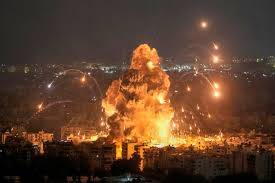Israeli Attacks Rock Gaza and Lebanon Amid New Ceasefire Push
As violence continues to escalate in the Middle East, Israeli airstrikes have intensified across Gaza and Lebanon, triggering widespread devastation and further complicating diplomatic efforts for a ceasefire. This renewed military campaign, which began in early October, follows a period of relative calm in Gaza but has since led to alarming levels of casualties, infrastructure damage, and displacement of civilians on both sides. International leaders are increasingly urging for a ceasefire as the humanitarian situation worsens, but the conflict shows little sign of abating.
Escalating Attacks and Destruction
Israeli airstrikes have been pounding Gaza for weeks in retaliation for rocket fire from Hamas militants and other armed factions based in the Palestinian enclave. The Israeli Defence Forces (IDF) claim that the strikes target military sites used by Hamas, including weapon storage facilities, tunnels, and command centres. However, the bombardment has also hit civilian areas, including residential buildings, schools, and hospitals, leading to significant casualties among the Palestinian population.
As of mid-November, more than 1,000 Palestinians have been killed, with thousands more injured and displaced. In Gaza, the health care system is on the brink of collapse due to the sheer volume of casualties and the destruction of key infrastructure. The United Nations has described the situation as “catastrophic†and warned that the risk of a humanitarian disaster in Gaza is growing by the day.
Meanwhile, in Lebanon, tensions have flared along the border, particularly in southern Lebanon where Hezbollah, the Iran-backed militant group, has increased its activity. In response to Israeli operations in Gaza, Hezbollah has launched a series of rocket attacks across the border into northern Israel, prompting retaliatory airstrikes by the IDF. Though the scale of the fighting in Lebanon has not matched the intensity of the conflict in Gaza, the situation remains volatile and risks further destabilization in the region.
Diplomatic Efforts for Ceasefire
In the wake of the escalating violence, world powers have called for an immediate ceasefire. The United Nations, European Union, and several Arab states have urged Israel and the Palestinian factions to halt hostilities and allow for the delivery of humanitarian aid to the besieged regions. A series of emergency sessions of the UN Security Council have been held, but achieving consensus on a ceasefire resolution has proven difficult due to political divisions, particularly between the United States and Russia, with the former consistently backing Israel's right to self-defence and the latter calling for a more balanced approach to Palestinian suffering.
On the ground, efforts for a humanitarian ceasefire have gained momentum. Human rights organizations have been vocal about the need for urgent humanitarian access to Gaza, where food, medicine, and basic supplies are rapidly running out. Meanwhile, international mediators have been in discussions with both Israeli and Palestinian leaders, trying to broker a temporary halt in fighting to allow aid convoys to reach civilians. However, such negotiations have repeatedly stalled, with both sides accusing the other of violations and of making unrealistic demands.
Impact on Civilians and Prospects for Peace
For ordinary citizens in Gaza and southern Lebanon, life has become increasingly unbearable. Families have been caught in the crossfire, with many forced to flee their homes in search of safety. In Gaza, airstrikes have decimated entire neighbourhoods, and there are reports of widespread shortages of food, clean water, and medical supplies. Humanitarian workers have warned of an impending health crisis if the conflict does not end soon.
In Lebanon, the fear of a wider regional conflict looms large. Hezbollah’s involvement could drag Israel into a two-front war, further destabilizing Lebanon and the surrounding area. Analysts have warned that any prolonged conflict between Israel and Hezbollah could have devastating consequences for Lebanon, which is already grappling with political instability and economic collapse.
As the fighting rages on, many fear that the window for a peaceful resolution is closing fast. With both sides showing little willingness to compromise, the international community faces an uphill battle in trying to de-escalate the conflict and establish a lasting ceasefire.
The situation remains fluid, and the coming days will be critical in determining whether diplomatic efforts can succeed in halting the violence or whether the region will be plunged into a deeper and more prolonged conflict.


